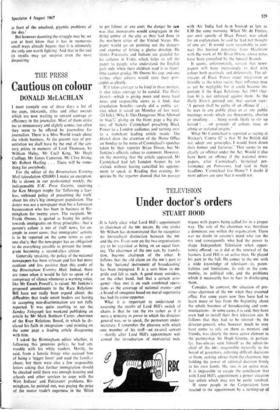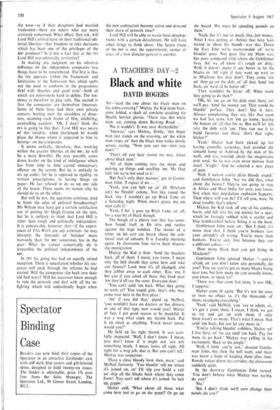Under doctor's orders
TELEVISION STUART HOOD
&It is fairly clear what Lord Hill's appointment as chairman of the sac means. By one stroke Mr Wilson has demonstrated that he recognises no hierarchical distinction between the BB( and the Ira. From now on the two organisations are to be regarded as being on an equal foot- ing. The chairman of the one can, by transla- tion, become chairman of the other. It follows that the old claim on the sac's part to be the 'national instrument of broadcasting has been impugned. It is a sore blow to BBC pride and felt as such. A good many outsiders, on the other hand, feel that a certain arro- gance—they met it on such combined opera- tions as the coverage of national events—and , a brand of smugness based on moral superiority has had its come-uppance.
What it is important to understand in assessing the results of Lord Hill's switch of chairs is that he ran the rrA rather as if it were a ministry in parvo in which the director- _general was, so to speak, the permanent under- _ secretary. I remember the pleasure with which ,.one member of his staff—an ex-civil servant —shortly after Lord Hill's appointment wel- comed the introduction of ministerial tech- niques with papers being called for in a proper way. The role of the chairman was therefore a dominant one within the organisation. There was no doubt in anyone's mind who ran the ITA and consequently who had the power to shape Independent Television when oppor- tunity offered—as it did at the renewal of the licences. Lord Hill is an active man. He played his part to the full. He comes to the BBC with a wide knowledge of television—its poten- tialities and limitations, its role in the com- munity, its political role, and the problems which it necessarily has to face in discharging them.
Consider, by contrast, the situation of pre- vious chairmen of the BBC when they assumed office. For some years now they have had to learn more or less from the beginning about the whole business of broadcasting and com- munications--in some cases, it is said, they have even had to install their first television sets. It follows that they had to be tutored—by the director-general, who, however much he may have come to rely on them as mentors and friends, was clearly the more active element in the partnership. Sir Hugh Greene. in particu- lar, has.always seen himself as the editor-in- chief of the sac, responsible .naturally to the board of governors, referring difficult decisions to them, seeking advice from the chairman, but holding the power of editorial decision firmly in his own hands. He, too, is an active man. It is impossible to escape the conclusion that with Lord Hill's appointment a power situation has arisen which may not be easily resolved.
If some people in the Corporation have reacted to the appointment by a turning-up 'of
the nose—as if their daughters had married tradesmen—there are others who are more seriously concerned. What effect, they ask, will Lord Hill's arrival have on their traditional edi- torial liberties—that freedom to take decisions which has been one of the privileges of the BBC producer? Is it not a fact that at the ITA Lord Hill was editorially restrictive?
In making any judgment on his editorial influence on the independent companies two things have to be remembered. The first is that the rra operates within the framework and limitations of the Television Act, which spells out the need to conform in the programme field with 'decency and good taste'—both of which are notoriously hard to define. The ten- dency is therefore to play safe. The second is that the companies are themselves timorous. Some of them have had their own private censors, leaning over the shoulders of direc- tors, scanning each frame of film, inhibiting, counselling caution: 'Oh, I don't think the rra is going to like that.' Lord Hill was aware of this timidity; when challenged he would place the blame where it appeared to him to belong—on the companies.
It seems unlikely, therefore, that, working within the greater liberties of the BBC, he will be a mere Bowdler. He may possibly come down harder on the kind of indulgence which has from time to time caused unnecessary offence on the screen. But he is unlikely to set up codes; for he is opposed to rigidity, to written prescriptions, to having things on paper. He has refused to do so on one side of the house. There seems no reason why he should do so on the other.
But will he not, the questions continue, tend to blunt the edge of political broadcasting? Mr Wilson may have got a certain satisfaction out of putting Sir Hugh Greene on the spot, but he is unlikely to think that Lord Hill is other than tough and politically independent. It is conceivable, however, that—if the experi- ences of This Week are any criterion—he may interpret the demands of 'balance' more narrowly than the BBC sometimes has in the past. What he cannot conceivably do is jeopardise the political independence of the
BBC.
In ifs/ his going has had an equally mixed reception. There is speculation whether his suc- cessor will push through the reforms he had started. Will the companies slip back into their old bad ways? Will his successor know enough to rule the network and deal with all the in- fighting which will undoubtedly begin when the new contractors become active and demand their share of network time?
Lord Hill will be able to watch these develop- ments with a certain detachment. He will have. other things to think about. The future shape, , of the Bec is one; the appointment, sooner or' later, of a new director-general is another.































 Previous page
Previous page